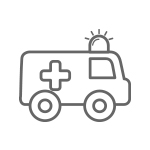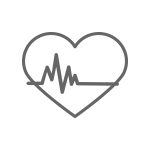Emergency Treatment Guide
We would like to inform you of the procedure for using the Emergency Room.
Emergency Treatment Procedure
The BS General Hospital Emergency Center is open 24 hours a day, 365 days a year to perform initial diagnosis, treatment, and stabilization for all emergency cases.
Through organic cooperation with each clinical department, we prioritize the safety of patients by providing emergency treatment.

Arrival at the emergency room

emergency accommodation

diagnosis

Medical treatment and aptitude test

Result judgment
Emergency Medical Service Fee
For patients who do not show symptoms according to the current emergency patient classification criteria under the current medical insurance fee, the full emergency medical service fee is the responsibility of the individual.
Emergency Symptoms Guide
1. Emergency Symptoms Chart
| Neurological Emergencies | Acute loss of consciousness, acute neurological abnormalities, symptoms such as vomiting or loss of consciousness due to head injury. |
| Cardiovascular Emergencies | Symptoms requiring cardiopulmonary resuscitation, acute chest pain due to heart disease, arrhythmia, abnormal heartbeats, shock, acute respiratory distress (abnormal range of respiratory rate and oxygen saturation by age). |
| Toxicity and Metabolic Disorders | Severe dehydration, excessive ingestion or poisoning of drugs, alcohol, or other substances, acute metabolic disorders (liver failure, kidney failure, diabetes, etc.). |
| Surgical Emergencies | cute abdominal pain requiring laparotomy (severe cases including acute peritonitis, intestinal ischemia, acute pancreatitis, etc.), extensive burns (more than 18% of the external body surface), penetrating injuries, open or multiple fractures, fractures of the femur or spine with potential risk of limb amputation, vascular injuries, symptoms requiring emergency surgery under general anesthesia, multiple trauma. |
| Hemorrhage | Continuous bleeding, uncontrolled bleeding. |
| Ophthalmological Emergencies | Eye injury due to chemical substances, acute visual loss. |
| Allergy | Allergic reactions accompanied by facial swelling. |
| Pediatric Emergencies | Pediatric febrile seizures. |
| Psychiatric Emergencies | Mental disorders with concern of self-harm or harm to others. |
2. Symptoms Corresponding to Emergency Conditions Guide
| Neurological Emergencies | Loss of consciousness, seizures. |
| Cardiovascular Emergencies | Respiratory distress (when respiratory rate and oxygen saturation are abnormal by age), hyperventilation. |
| Surgical Emergencies | Burns, general abdominal symptoms including acute abdominal pain, fractures, trauma or dislocations, other symptoms requiring emergency surgery, urinary dysfunction. |
| Hemorrhage | Vascular injury. |
| Pediatric Emergencies | Pediatric seizures, fever over 38°C (Symptoms that occur in children under 8 years of age when medical services are not readily available, such as on holidays or during the night from 18:00 to 09:00 the next day). |
| Obstetric Emergencies | Symptoms requiring obstetric examination or treatment due to childbirth or sexual assault. |
| Foreign Body Emergencies | Patients requiring removal of foreign bodies in the ears, eyes, nose, or anus. |